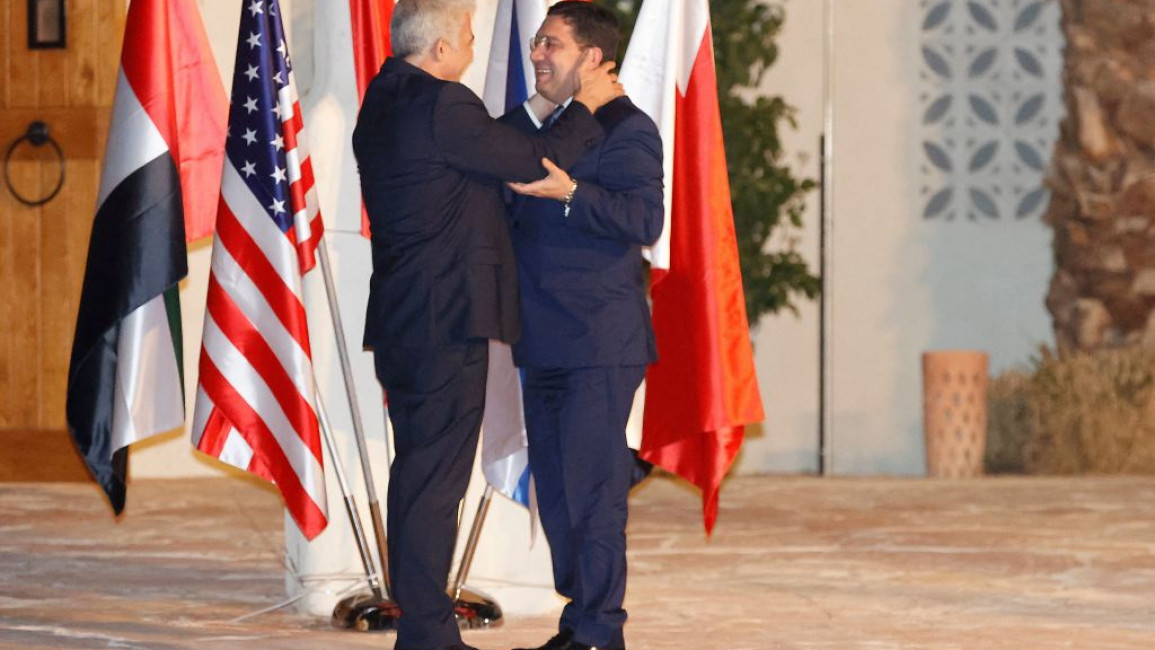Israeli diplomat accuses Morocco, Arab states of 'ethnic cleansing' Jews
Israel's envoy to Spain accused Morocco and several Arab states of committing "ethnic cleansing" against Jewish communities in their countries, leading to a drastic decrease in their numbers since 1948.
"Tell me more about ethnic cleansing in the Middle East," wrote Dan Poraz, Israel's deputy ambassador to Madrid, as he shared on Sunday, 26 November, an image titled 'Jewish population in Arab countries' that displays the number of Jewish communities decreasing to zero in some Arab states.
Poraz's tweet ignited wide controversy over social media platforms, especially among Moroccan users for whom the Israeli envoy's post was problematic for three reasons: the ethnic cleansing accusation, referring to Morocco as an Arab country and using a map showing Morocco without the Western Sahara territory despite Tel Aviv's recognition of Rabat's sovereignty over the region.
Tell me more about ethnic cleansing in the Middle East. pic.twitter.com/nlusX2Xi1p
— Dan Poraz (@PorazDan) November 26, 2023
The backlash led to another post from Poraz on Tuesday, singling out Morocco as an "example of coexistence" and acknowledging the use of "the wrong map." However, he did not take back the ethnic cleansing accusations.
While Poraz's graphic is from an unknown source, the numbers it states are more or less true.
The question is, what happened to the Jewish community in Morocco, and what were the reasons behind their departure?
The Jewish community in Morocco
In Casablanca, Marvin, a 72-year-old Jewish Moroccan man who knows very little about social media drama, sighed in disbelief when he was told about the Israeli envoy's post.
"How sad that Israeli politicians like to share lies (...) to dramatise our history further, to serve their agendas," Marvin said to The New Arab.
Marvin says he was too young to remember the details of his family's life in the early fifties. Still, he recounts vividly his father's love and admiration of King Mohammed V, a well-beloved figure in the community in Morocco, and his advice to him and his siblings not to leave "Lblad" (the homeland).
"Mohammed V did everything to prevent the French protectorate from implementing Vichy's anti-Semitic laws, refusing deportation and the wearing of the yellow star," according to the Moroccan-Israeli historian Ami Bouganim.
When Paris fell to the Germans in July 1940, Morocco was still under French colonisation and was instructed to impose anti-Semitic laws against its quarter million community.
However, Mohammed V, named Commander of the Faithful, viewing his role as including all "people of the book," reportedly refused to implement such laws, declaring, "There are no Jews in Morocco. There are only Moroccan subjects."
Vichy authorities soon forced Mohammed V, whose authority was limited at the time, to promulgate two laws restricting certain professions and schools to Jews and requiring them to live in ghettos.
According to French historian Yves Benot, Mohammed V abolished dhimmitude after Morocco's independence in 1956. He appointed Moroccan Jews to ministerial positions (such as Leon Benzaquen in the Ministry of Posts). Today, the memory of Mohammed V is regularly honoured. In Ashkelon, Israel, for example, a statue of the first king of Morocco was erected in 1986."
"That man (King Mohammed V) loved us and protected us before it became an à la mode thing to do," said Marvin, who says he still hangs a picture of the late king in his living room.
Tensions between Jewish communities in the region and their neighbours began to emerge in reaction to the violent establishment of Israel in 1948 by Zionist forces and continued to intensify with every subsequent war by Israel after that date.
Between 1955 and 1956, approximately 60,000 Jews left Morocco for Israel. These departures continued until 1961, when King Hassan II allowed Jews to immigrate to Israel. Eighty thousand Moroccan Jews, often very poor, left seeking economic jobs and housing opportunities. After the Arab-Israeli war in 1967 and 1973, in an increasingly hostile climate, 40,000 Jews from Morocco settled in France.
Today, Approximately 2,000 are left in Morocco, mainly in Casablanca, making it the largest Jewish community in North Africa.



